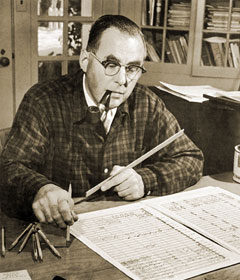Finney, Ross Lee
Biography
Born: December 23, 1906
Died: February 4, 1997; Carmel, California
Country: Wells, Minnesota, U.S.A.
Studies: University of Minnesota (1924-25), Carleton College (B.A.1927, L.H.D.1957), Harvard University
Teachers: Donald Ferguson, Nadia Boulanger, A. Berg
Born December 23, 1906 in Wells, Minnesota, Ross Lee Finney began playing and composing music as a child, learning cello and piano, as well as guitar. Indeed, Finney retained an interest in the guitar and folk music throughout his life, and folk song and melody continued to be important elements in his music.
He took his first serious music courses at the University of Minnesota in Minneapolis, where he studied under Donald Ferguson. He received a B.A. from Carleton College in 1927, after which he traveled to Paris to study composition with Nadia Boulanger. Finney's other teachers included Edward Burlingame Hill (1928-29), Alban Berg in Vienna (1931-32), and Roger Sessions (1935), with whom he enjoyed a long friendship.
As a 20-year-old student in Paris in 1927, Finney treasured his copy of James Joyce's Chamber Music and recalled seeing Joyce at Left Bank cafés, where he tried to catch some of the fascinating conversations between the famous author and his distinguished friends. Later, while stationed in Paris during World War II, he began to think seriously about setting those poems. "By late 1951, the work had become so clear in my mind that I composed the entire cycle in a matter of a few months."
A prolific artist, Finney's other works include eight string quartets, four symphonies, numerous chamber works and song cycles, two stage works, and an unfinished opera, A Computer Marriage. He received the 1927 Pulitzer Prize for his First String Quartet. Other awards followed throughout his career, including two Guggenheim fellowships, the Boston Symphony Award, the Brandeis Medal, and election to both the National Institute of Arts and Letters and the American Academy of Arts and Sciences.
Finney joined the faculty of Smith College in Massachusetts in 1929. From 1943 to 1945 he served in the Office of Strategic Services in France, where he sustained combat injuries and received a Purple Heart.
In 1949 he was appointed professor of music and composer-in-residence at the University of Michigan in Ann Arbor, where he attracted many students who went on to become important composers, including Robert Ashley, William Albright, Leslie Bassett, George Crumb, and Roger Reynolds. Until his retirement in 1974, Finney headed both the Composition Department and a graduate program in composition at the School of Music, and he continued composing through the mid-1980s.
Paul C. Boylan, dean of the School of Music and Vice Provost for the Arts at the University of Michigan, praised Finney as "an extraordinary musician and human being. The remarkable success of his students, and their devotion to him, are ample testament to his achievement as a dedicated, inspiring and challenging teacher. He was a teacher whose own creative activity enriched and informed his students."
Finney's music was tonal and melodic while sometimes employing serial technique, particularly after 1950; he lectured and wrote about the evolution of his style and his continuing interest in tonal resources.
He was also interested in setting poetry to music. In the course of his career he composed for many musical settings, including soloists, chamber groups, choirs, wind ensembles, orchestras, opera, and dance. His output was prolific and his music was performed often in his lifetime, both at the University of Michigan and by major orchestras and chamber groups around the country. He frequently served as a guest artist and lecturer at universities and symposia and wrote about composition and music education for both children and advanced students.
Finney died in Carmel, California, on February 4, 1997. He had two sons, Henry and Ross Jr.[1]
Works for Percussion
Concerto for Percussion and Orchestra (Finney) - Percussion Quartet; Orchestra
Conflict - Percussion Quartet
Images (Finney) - Percussion Duo; Piano
Movement - Percussion Duo; Piano
Study for Three Percussionists - Percussion Trio
Three Studies in Fours - Percussion Sextet
Whistles - Percussion Duo
References
